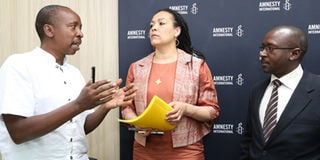Half of Kenyans fear torture in custody

Amnesty International (AI) Regional Director Horn and East Africa Region Muthoni Wanyeki (Center) conversing with one of the Nyayo torcher Chambers victims Wachira Waheire (left) and Independent Medico Legal Unit (IMLU) Executive Director Peter Kiama during a press conference at their offices in Nairobi on May 13, 2104. BILLY MUTAI (NAIROBI)
What you need to know:
“In Africa, at least half the respondents in Kenya (58 per cent) and Nigeria (50 per cent) feared they would be at risk of torture if taken into custody,” Amnesty said in its latest study.
More than half of Kenyans are afraid of being tortured by the government if arrested, a new report by the New York based human rights group Amnesty International shows.
The report that surveyed 21,221 people in 21 countries says that 58 per cent of Kenyans fear that they could be tortured by the government in custody compared to the global average of 44 per cent.
The study puts Kenya among top 5 countries whose citizens are most afraid of torture together Brazil, Mexico, Pakistan and Turkey.
“In Africa, at least half the respondents in Kenya (58 per cent) and Nigeria (50 per cent) feared they would be at risk of torture if taken into custody,” Amnesty International said in its latest study.
More than fourth fifths (84 per cent) of Kenyans agree that clear rules are needed to fight against torture
Only 10 African nations have adopted domestic legislation outlawing torture, despite the fact that the African Charter on Human and People’s Rights - ratified by all but one African Union state - expressly prohibits the practice.
“African governments have yet to acknowledge the problem, let alone begin to rectify it,” said Netsanet Belay, Amnesty International’s Research and Advocacy Director for Africa.
Amnesty International has documented various forms of torture used across Africa. In prisons and detention centres torture is routinely used as a means of extracting “confessions”.
Detainees are beaten, tied in painful positions, held in extreme weather conditions, suspended from ceilings and sexually abused in countries including Ethiopia, the Gambia, Kenya, Mali, Nigeria, Senegal, Sudan and Zimbabwe.
Allegations of abuse in South Africa, including the use of electric shocks and beatings, emerged in the past year from a privately run prison at Mangaung’s high-security prison.
In Mauritania, courts have declared that “confessions” extracted under torture or other forms of ill-treatment are admissible as evidence, even if they are subsequently retracted.
Britain was the country with the least number of respondents who feared being tortured in case of arrest at 15 per cent.




